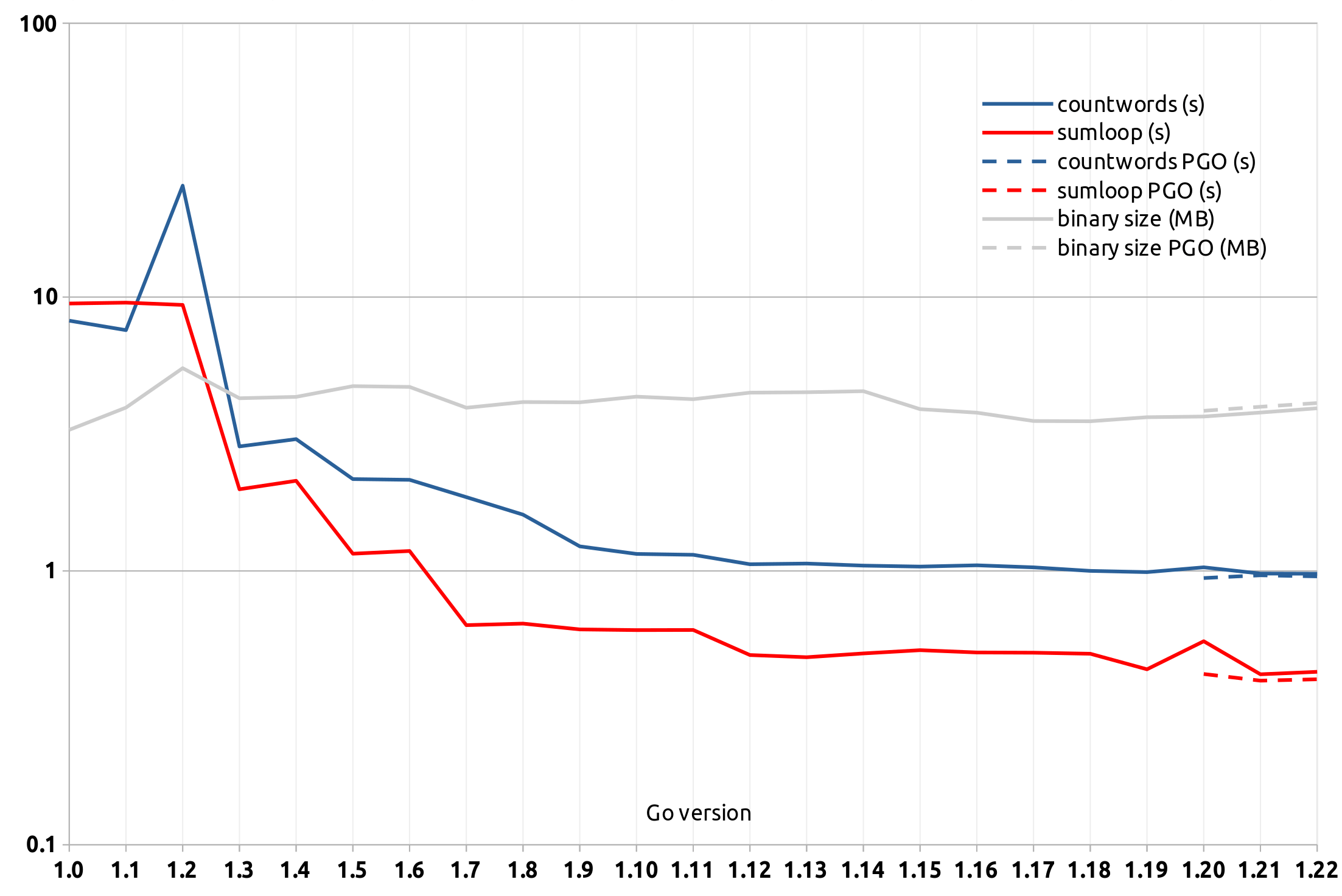Go performance from version 1.0 to 1.22
April 2024
Two years ago I compared two different benchmarks of my GoAWK interpreter on all the versions of Go from 1.2 through 1.18.
In this article I re-run those benchmarks, adding the missing Go versions (1.0 and 1.1) as well as the new versions (1.19 through 1.22). I also include results with profile-guided optimisation (PGO), which was added in Go 1.20. I’ll quote a fair bit from my original article so you don’t have to re-read the old one to understand the setup.
There are many ways programs written in Go have gotten faster: the Go team and external contributors have improved the compiler and have optimized the runtime, garbage collector, and standard library. Here we compare GoAWK’s performance when compiled using each released version of Go from 1.0 through 1.22 – the latest at the time of writing.
I tested this by running GoAWK on two AWK programs which represent different extremes of what you can do with AWK: I/O with string processing, and number crunching.
First we have countwords, a string processing task that counts the frequencies of words in the input and prints out the words with their counts. This is the kind of thing that’s typical for an AWK script. The input is a 10x concatenated version of the King James Bible (which I’ve used before for performance comparisons). Here’s the code:
{
for (i=1; i<=NF; i++)
counts[tolower($i)]++
}
END {
for (k in counts)
print k, counts[k]
}
The second program is sumloop, a tight loop that adds the loop counter to a variable a bunch of times. This one’s not really a typical use of AWK, but makes for a good test of the GoAWK bytecode interpreter loop:
BEGIN {
for (i=0; i<10000000; i++)
sum += i+i+i+i+i
}
I had to tweak GoAWK’s code slightly to get it to compile on older Go versions. In particular for Go 1.0, because it doesn’t have bufio.Scanner, and GoAWK uses that heavily. I used the Go 1.1 implementation of bufio.Scanner for 1.0.
The timing numbers in the chart are the time in seconds on my x86-64 Linux laptop (best of three runs). The blue line is countwords and the red line is sumloop (incidentally, I had mis-labelled the results last time). Note that the Y axis is logarithmic this time, in an effort to see the more subtle improvements in recent versions more clearly.
Also included on the chart are the GoAWK binary sizes for each Go version – that’s the light grey line.
Once again, I used a Python script to run them all and measure the timings. Here is the chart (or as a table if you prefer):

The biggest improvements come in versions 1.3, 1.5, 1.7, and 1.12. After that, it’s very gradual speedups – all the low-hanging fruit has long since been picked.
This time there was a strange bump for countwords in Go 1.2: it went from 7.5s in 1.1 to 25.5s in 1.2 (!), and then down to 2.8s in 1.3. This is almost certainly caused by the stack “hot split” issue which was fixed in 1.3 due to the Go team changing “the implementation of goroutine stacks away from the old, ‘segmented’ model to a contiguous model.”
I figured out the cause of the 1.2 anomaly by profiling, and noticing that runtime stack operations made up a huge percentage of the running time. Here’s the first few lines of the pprof output:
$ go tool pprof --text ./goawk_1.2 go12.prof
Total: 1830 samples
332 18.1% 18.1% 332 18.1% runtime.newstack
296 16.2% 34.3% 296 16.2% runtime.memclr
281 15.4% 49.7% 281 15.4% runtime.oldstack
222 12.1% 61.8% 619 33.8% github.com/benhoyt/goawk/interp.(*interp).execute
91 5.0% 66.8% 91 5.0% runtime.lessstack
75 4.1% 70.9% 133 7.3% github.com/benhoyt/goawk/interp.(*interp).callBuiltin
57 3.1% 74.0% 57 3.1% runtime.stackfree
53 2.9% 76.9% 81 4.4% strings.FieldsFunc
...
PGO improves the performance by only a few percent, about 2% for countwords and 7% for sumloop using Go 1.22. I compile the released GoAWK binaries with PGO.
Binary size has remained fairly stable over the years, apart from the large bump in 1.2. Even with PGO enabled, binaries are only about 5% bigger, so I think it’s normally worth it.
Overall, countwords is now about 8x as fast as it would have been with Go 1.0, and sumloop is 24x as fast. Thanks, Go team, for all your hard work over the years!
I’d love it if you sponsored me on GitHub – it will motivate me to work on my open source projects and write more good content. Thanks!